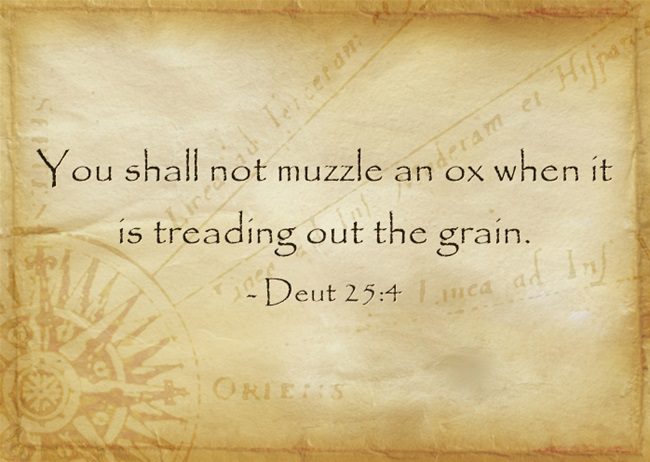What does “Do not muzzle the ox” mean in the Bible?
The Old Testament Meaning
Does the command, “You shall not muzzle an ox when it is treading out the grain” (Deut 25:4) mean the same thing as it does in the New Testament? In the first place, this command shows God’s heart for His creatures. Solomon wrote “Whoever is righteous has regard for the life of his beast, but the mercy of the wicked is cruel” (Prov 12:10). The idea behind the law to not muzzle an ox while it is working to produce grain is that the ox deserves to partake in some of his own labor and so the command is to not to muzzle the ox. This means they allow him to eat from part of his labor while he treads out the grain. It seems cruel to make an animal work for man to produce food while depriving it of the same thing. That’s why this law was given to Israel; to protect the animals that labored for the people because this apparently wasn’t happening outside of the nation of Israel. This is also the principle that can be taken out of this verse in the way we treat laborers. That is, the laborer should be treated fairly and not be deprived of the wages that they deserve.
 New Testament Meaning.
New Testament Meaning.
The Apostle Paul quotes Deuteronomy 25:4 as you can tell by his writing, “For it is written in the Law of Moses, “You shall not muzzle an ox when it treads out the grain.” Is it for oxen that God is concerned” (1st Cor 9:9). When anyone in the New Testament says “It is written” or “You have heard it said of old” so Paul was using the example of Deuteronomy 25:4. The context of 1st Corinthians 9 is that Paul has the right or those who preach the gospel have the right to be supported in their ministry. It is the same principle of showing mercy to the servant of God for his or her labor and being merciful to the servant of man (the ox) for their labor and that neither should be muzzled and not be able to partake in the fruits of that labor. Paul writes, “If others share this rightful claim on you, do not we even more” (1st Cor 9:12) and to make sure everyone knows exactly what he is writing about, he continues by writing, “Do you not know that those who are employed in the temple service get their food from the temple, and those who serve at the altar share in the sacrificial offerings? In the same way, the Lord commanded that those who proclaim the gospel should get their living by the gospel” (1st Cor 9:13-14). That could not be any clearer to the reader. You don’t need to be a theologian or Bible scholar to understand that “those who proclaim the gospel should get their living by the gospel” (1st Cor 9:14). You cannot reach any other possible conclusion with these verses than to not muzzle the ox and not support those who are laboring in the fields of the world.
What does it Mean?
To be sure that this important point of not muzzling the ox by supporting the preachers of the word, including missionaries, support staff, and so on, Paul writes to Timothy to remind him that “the Scripture says, “You shall not muzzle an ox when it treads out the grain,” and, “The laborer deserves his wages” (1st Tim 5:18). In the same chapter where we’re told to not muzzle the ox, the Law said in regards to laborers, “You shall give him his wages on the same day, before the sun sets (for he is poor and counts on it), lest he cry against you to the LORD, and you be guilty of sin” (Deut 24:15). Even with this law, many employers took great advantage of their laborers and sometimes didn’t pay them at all. This was not uncommon in Jesus’ day either as Jesus’ half-brother James giving a scathing indictment against the rich by writing, “Behold, the wages of the laborers who mowed your fields, which you kept back by fraud, are crying out against you, and the cries of the harvesters have reached the ears of the Lord of hosts” (James 5:4). They knew better because even the Old Testament law said “You shall not oppress your neighbor or rob him. The wages of a hired worker shall not remain with you all night until the morning” (Lev 19:13). If the rich are defrauding their laborers and not paying them a fair wage, then they are also breaking the command to not steal (Ex 20:15).
Conclusion
Today it is not unusual for a company to relocate overseas or in Mexico because they laborers will work for less and the fat-cat CEO’s will make even more. The disparity between the rich and the poor is ever widening and more rapidly today than ever before. It’s like a disease almost. The conclusion of the verse “Do not muzzle the ox” is clear; a worker is worthy of his or her wages, no matter who they labor for and ultimately, we all work for God anyway (Gal 3:23) and really, you and I are “rendering service with a good will as to the Lord and not to man” (Eph 6:7).
Article by Jack Wellman
Jack Wellman is Pastor of the Mulvane Brethren Church in Mulvane Kansas. Jack is also the Senior Writer at What Christians Want To Know whose mission is to equip, encourage, and energize Christians and to address questions about the believer’s daily walk with God and the Bible. You can follow Jack on Google Plus or check out his book Teaching Children the Gospel available on Amazon.











